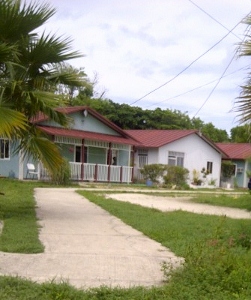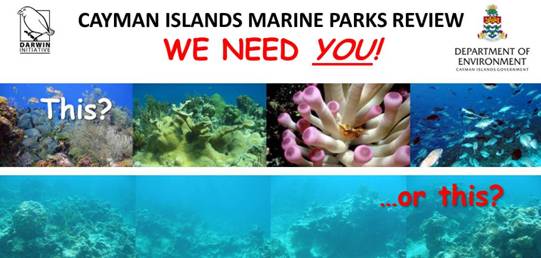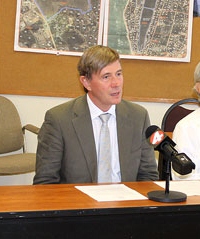Archive for October 15th, 2012

ACC has ten active cases
 (CNS): Since its creation in January 2010 the Anti-Corruption Commission (ACC) has kept a low profile and been tight lipped about the investigations it has undertaken, and only one person has been charged under the relevant legislation. However, it has now produced a newsletter and begun publishing minutes of meetings on its website. According to the latest minutes, the RCIPS Anti-corruption Unit is actively working on ten live investigations, having received some 53 complaints since its inception. In the newsletter the ACC says that while the destructive results of corruption are obvious, in practice it is difficult to identify corruption in every case.
(CNS): Since its creation in January 2010 the Anti-Corruption Commission (ACC) has kept a low profile and been tight lipped about the investigations it has undertaken, and only one person has been charged under the relevant legislation. However, it has now produced a newsletter and begun publishing minutes of meetings on its website. According to the latest minutes, the RCIPS Anti-corruption Unit is actively working on ten live investigations, having received some 53 complaints since its inception. In the newsletter the ACC says that while the destructive results of corruption are obvious, in practice it is difficult to identify corruption in every case.
In the latest minutes which have been published on the website from the commission’s August meeting, Detective Inspector Richard Oliver, who is one of the RCIPS’ Anti-corruption Unit officers, reported on the types of cases being handled by the unit, the workload and the resources needed. Specific details such as names, locations and dates were not included in the minutes due to security issues.
Since inception there have been 53 complaints registered with the ACC. Of those, 20 are 'pending' and waiting further or sufficient information which may make it appropriate to make further investigations. Another 20 have been concluded, three have been transferred to other investigative units for action and ten are under current active investigation.
In the commission’s second ever newsletter, the ACC offers advice to civil servants about receiving gifts and whether it is ever appropriate even if the intention is not corrupt.
“The intention behind the giving of a gift — and what the community may perceive as the intention — should always be considered in determining whether accepting the gift is appropriate,” the letter states. “Public officials need to have a very clear understanding of what to do when they are offered a gift or benefit and the implications of accepting a gift or benefit. The offer of gifts or benefits can present a corruption risk because it has the potential to affect the impartiality and integrity of the agency in carrying out its functions.”
Although gifts and benefits may be offered out of gratitude and goodwill for a job well done, they can also be a subtle form of influence creating a sense of obligation that may compromise impartial and honest decision making, the ACC warned.
Advising managers to make a risk assessment of conflicts of interest in their departments, the ACC said that this can help identify any undue influence or bribery that may be going on. Government departments need to introduce policy and procedures for the management of gifts and benefits, which include sanctions for any breach of the procedures, train employees, record all gifts and prohibit employees from accepting or soliciting cash or gifts under any circumstances.

Old AG report still reveals lessons for government
 (CNS): The first report conducted by the Office of the Auditor General (OAG) into the local affordable housing scheme shows that government was warned more than eight years ago about the problems that can arise when it fails to follow due process. Reflecting on the report he wrote in August 2004, the former auditor general, Dan Duguay, told CNS that, as old as the report was, it still had some value to government. “There are still lessons to be learned of the dangers of going without proper procurements, which is a recent theme in government. It seems like sometimes government never learns,” Duguay said after the report was released following a freedom of information request by CNS.
(CNS): The first report conducted by the Office of the Auditor General (OAG) into the local affordable housing scheme shows that government was warned more than eight years ago about the problems that can arise when it fails to follow due process. Reflecting on the report he wrote in August 2004, the former auditor general, Dan Duguay, told CNS that, as old as the report was, it still had some value to government. “There are still lessons to be learned of the dangers of going without proper procurements, which is a recent theme in government. It seems like sometimes government never learns,” Duguay said after the report was released following a freedom of information request by CNS.
The audit had been kept under wraps for so long because it was conducted before the relevant rules relating to the auditor general’s reports were altered to allow the office to release its work to the public a few days after being seen by the Public Accounts Committee members.
The report was finally examined by the parliamentary committee at its last meeting in September, when Dr Frank McField gave evidence to the committee and defended the way in which the project had been procured and the quality of the homes.
The current auditor general, Alastair Swarbrick, said that his office was not going to spend any considerable time going over the findings as it was some eight years old. However, he said that the issues raised by his predecessor in the old report are almost identical to those his office is still raising in the more recent reports relating to procurement.
Following its release, Duguay pointed out that it wouldcertainly have been far more useful if his work had been issued earlier as the main problems could have been probed and resolved much quicker.
“It raised several important points but the most important one is that contracts were issued without tender. There is also good evidence that local contractors could have done a good job at nearly the same costs but they were not permitted to bid,” Duguay said.
He also pointed to issues concerning not adhering to building standards, which have unfortunately proven to be true as the homes are now rusting out.
The publication of the old report comes in the wake of news from the current National Housing and Development Trust that the new homes currently being constructed under the initiative will no longer be sold but rented and the admission that building genuinely affordable homes in the Cayman Islands for those that cannot buy on the open market is impossible.
Plagued with problems from the get-go, the current NHDT boar chair Rayal Bodden and the general manager Julius Ramos said that these issues are now behind the trust. The men said that the public could rest assured that not only are the houses now being developed by the Trust up to standard but that the money it handles is also all accounted for.
“The NHDT has carefully considered recommendations of old audits and investigation reports and implemented effective systems to ensure proper checks and balances,” the officials said in a statement released Friday. “This has resulted in a good working relationship with the Auditor General’s Office for the past few years.”
The NHDT is also in the process of developing a new website that will include meeting minutes, financial statements, the publication scheme, NHDT’s public service information and application forms, as well as a “Homes-For-Sale” database.
In the meantime, the trust encouraged interested parties to make Freedom of Information requests to foi.nhdt @gov.ky
Retaled articles:
See AG's report here
See statement from NHDT below.

FCU: Not enough suspicious activity reports filed
(CNS Business): The volume of suspicious activity reports (SARs) being filed in the Cayman Islands is far too low considering that the jurisdiction is the fifth largest in the world, according to Detective Superintendent Brian Donley, lead in the RCIPS Financial Crimes Unit. DS Donley said that there had to be more suspicious activity taking place in Cayman and compliance officers were either being prevented from reporting such suspicious activity or were just not seeing it. Better relations between the authorities and the private sector might improve the situation, he believed but thought the authorities were sometimes slow in responding back to the private sector once they had reported a SAR for many reasons, one of which was that sometimes people politically linked within the island might be involved in the suspicious activity report and such cases could take years to solve. Read more on CNS Business

Survey finds 50% want bigger marine parks
 CNS): Following responses from almost 1000 people to the Department of the Environment’s consultation survey regarding the future of Marine Parks in Cayman, the proposals for the new designations will be revealed in details by the DoE over the next few weeks. Gina Ebanks- Petrie the DoE director said that over half of those who responded wanted to see extended protection for Cayman’s marine habitat and 90 per cent wanted to see more law enforcement. Only 10% of those who took part said that they did not wish to see any changes. The review of the current marine parks and zones has revealed that the law has helped to protect the country’s fragile marine habitat but it is clear more needs to be done, the director said.
CNS): Following responses from almost 1000 people to the Department of the Environment’s consultation survey regarding the future of Marine Parks in Cayman, the proposals for the new designations will be revealed in details by the DoE over the next few weeks. Gina Ebanks- Petrie the DoE director said that over half of those who responded wanted to see extended protection for Cayman’s marine habitat and 90 per cent wanted to see more law enforcement. Only 10% of those who took part said that they did not wish to see any changes. The review of the current marine parks and zones has revealed that the law has helped to protect the country’s fragile marine habitat but it is clear more needs to be done, the director said.
Local experts have said that the coral reefs in Cayman still need more protection as threats intensify. With proposals on how to do that now complete the first meeting will be on 23 October when the DoE will reveal what it hopes will become the new boundaries for no take zones among other changes and gather public opinion on the proposals for further protection for the next 25 years. The proposals are based not just on scientific research but from the information gathered during the public survey period which started a year ago.
The goal, Ebanks- Petrie explained, is to increase the protected areas on the reef eventually from 15% to around 40% changing some replenishment zones to no take and extending across the local reef shelve and down the wall.
“Long-term protection allows the entire range of species and habitats to recover,” she said, adding that it gives critical marine creatures time to grow and mature. “As larger fish produce more eggs, this benefits the ecosystem and fishery. If no-take areas are re-opened, the benefits of improved ecosystem health and a bigger fishery can be quickly lost,” she warned as she invited everyone to come out to look at the future proposals and offer their view.

“If we want to continue to fish in the future and make money from tourism, we need to make sure we look after what we have,” Ebanks-Petrie added emphasizing that the need to expand the protection. “Healthy coral reefs and mangroves provide critical coastal protection to our small, low-lying islands and coral reefs are one of the most diverse and fragile ecosystems on earth.”
The parks were created 25 years ago and while they have proved to be successful, they need to be extended and that extension needs public support the DoE boss stated. There are now new threats to consider associated with climate change, such as a warming ocean, increases in sea surface temperature, more storm activity, ocean acidification and sea level rise.
See details of public meeting schedule below

Fraudster steals over $850K
(CNS): A Cayman based insurance manager has admitted stealing over US$856,000 from an insurance firm and its clients. David Self pleaded guilty to two counts of theft and one count of possession of criminal property on Friday morning in the Grand Court. Self had originally faced some 18 counts of theft and fraud relating to almost US$1 million but after negotiations with the crown the indictment was changed to roll the charges together. Self was remanded in custody to HMP Northward ahead of his sentencing hearing, which is scheduled for 30 November. According to a civil claim in the Grand Court, Self’s fraud resulted in the collapse of Monkton Insurance, which was registered in Cayman in 1997 and regulated by CIMA.
The theft took place throughout 2011 and Self (53) was arrested in February this year. Then in April liquidators filed a petition in the Grand Court to wind up the business, described as “hopelessly insolvent” as a result of the misappropriation of funds. Since then, Self has also been served with several suits in an effort to recover the cash from related firms.
Self has admitted stealing $856,000 from Warco Insurance, one of two claimants.
In June the local Insurance Managers Association had claimed the crime was exposed because of the local regulatory system. IMAC said that while news of the crime was not welcome, it illustrated that the regulatory environment had performed in exactly the way it should and had brought the alleged fraud to the attention of the authorities.
However, the court heard Friday that Self had perpetuated the fraud over a twelve month period before the crime was exposed.
Related articles on CNS Business:

Power returns after lightening hits lines
 (CNS): Updated 11:40am — Impressive electrical storms across Grand Cayman may provide a great free light show but they caused trouble for the local power company. Customers in parts of George Town, Prospect, Frank Sound, Rum Point, East End, Bodden Town and Savannah were without power from about 4am today following suspected multiple lightning strikes that affected the CUC transmission system. Customers served by the Rum Point, Frank Sound, Bodden Town and Prospect substations were affected. Power was restored to all customers by 6:10am. CUC sincerely apologizes for the inconvenience these outages may have caused.
(CNS): Updated 11:40am — Impressive electrical storms across Grand Cayman may provide a great free light show but they caused trouble for the local power company. Customers in parts of George Town, Prospect, Frank Sound, Rum Point, East End, Bodden Town and Savannah were without power from about 4am today following suspected multiple lightning strikes that affected the CUC transmission system. Customers served by the Rum Point, Frank Sound, Bodden Town and Prospect substations were affected. Power was restored to all customers by 6:10am. CUC sincerely apologizes for the inconvenience these outages may have caused.
Thunderstorms have been behind a number of power failures recently that has also affected the TV station as well as CUC.
However, the firm has also had cause to cut power on a rolling basis recently as a result of maintenance issues which have since been addressed. According to the local weather services further thunderstorms are forecast for the next three days.

TCI constitution proclaimed after 3 year-direct rule
 (CNS): The Turks and Caicos constitution finally came into effect Monday marking the beginning of the end for the UK government ahead of the General Election next month when democracy will return to the overseas territory. The UK took over three years ago in the wake of a major corruption scandal and began a controversial reform programme designed to improve transparency, accountability and public financial management. With what were termed as the eight milestones largely achieved country’s new constitution has now been proclaimed.
(CNS): The Turks and Caicos constitution finally came into effect Monday marking the beginning of the end for the UK government ahead of the General Election next month when democracy will return to the overseas territory. The UK took over three years ago in the wake of a major corruption scandal and began a controversial reform programme designed to improve transparency, accountability and public financial management. With what were termed as the eight milestones largely achieved country’s new constitution has now been proclaimed.
“Today marks the culmination of a huge amount of work to get the country to this point where it is significantly more transparent, accountable and financially better run,” the TCI governor, Ric Todd said. “We now have a modern Constitution that is the result of wide consultation including a Turks and Caicos delegation who visited London in the summer of 2011 to help ensure that it reflects the wishes of both the citizens of the islands and Ministers in London.”
The former OT’s mnister from the FCO Henry Bellingham had announced in the that sufficient progress had been made to allow elections and the governor said he was impressed by the “diligent preparations” of the local political parties. .
“We have an experienced international observers coming to our Islands for the elections. They will be here to ensure that 9thNovember passes off as intended as a free and fair democratic election. I welcome their presence and look forward to receiving their reports over the weekend after polling day,” he added. “The Government’s work does not now stop until after the election results are announced and a new administration is in place.”
Todd stated that the new constitution will help the incoming administration govern fairly and transparently, and in tandem with the other legislative enhancements.
“The education programme launched last week by the Supervisor of Elections will ensure that all citizens eligible to vote are fully informed on the new electoral system and the choices they will be asked to make on the Electoral District and All Island ballot papers,” hesaid. ““The building blocks for successful elections are now in place and we all eagerly anticipate the return to elected government here in the Turks and Ciacos Islands.”
The interim administration had taken over TCI following the suspension of parts of the previous 2006 Constitution after the Sir Robin Auld Commission of Inquiry found that there was “a high probability of systemic corruption in government and the legislature and among public officers in the Turks & Caicos Islands in recent years.”

Importance of statistics pressed by ESO
 (CNS): The Economics and Statistics Office will be doing its best to emphasise the importance of statistics Monday, in a community that is often reluctant to take part in surveys. The ESO will lead observance of the CARICOM-designated Caribbean Statistics Day in the Cayman Islands. This year’s theme, Working together to improve statistics in the 21st century and beyond and the office will highlight the importance of statistics that are credible, relevant, timely and user-friendly and that inform meaningful decision-making by government, the private sector and all other stakeholders.
(CNS): The Economics and Statistics Office will be doing its best to emphasise the importance of statistics Monday, in a community that is often reluctant to take part in surveys. The ESO will lead observance of the CARICOM-designated Caribbean Statistics Day in the Cayman Islands. This year’s theme, Working together to improve statistics in the 21st century and beyond and the office will highlight the importance of statistics that are credible, relevant, timely and user-friendly and that inform meaningful decision-making by government, the private sector and all other stakeholders.
In his message marking the regional day the Secretary-General Of The Caribbean Community (Caricom), Irwin Larocque, said the day underscores the need for collaborative actions and the building of partnerships to enable the investment of adequate resources in statistics.
Despite certain achievements across the region he said there were still critical data gaps and problems with the quality and timeliness of the statistics.
“Statisticians across the Region are encouraged to continue to bridge the gaps in the data and in its timeliness, which will ensure that users of statistics are provided with accurate, reliableand timely statistics for decision-making,” he said.
On Monday, ESO staff will make presentations on the Census data to students of John Gray and Clifton Hunter high schools during the day about their work in Cayman and a similar presentation to the statistics students at the University College of the Cayman Islands at 7.30pm. Additionally, Sterling Dwayne Ebanks will host a group discussion on Radio Cayman’s Talk Today at 1 p.m., featuring ESO Acting Director Elizabeth Talbert and Senior Statistician Julietta Beaupierre, Customs Training Manager Langlie Powery and Chamber of Commerce CEO Wil Pineau.